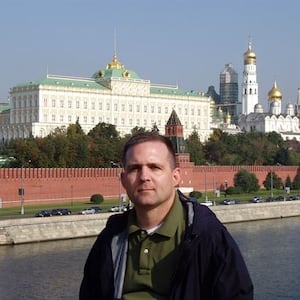MOSCOW—Lefortovo Prison is one of the oldest, most notorious jails in this city. During the Great Purge in the 1930s, Josef Stalin’s NKVD agents tortured inmates there to prepare them for the kind of show trials Arthur Koestler wrote about in his famous novel Darkness at Noon. Alexander Solzhenitsyn, the Nobel Prize-winning author of The Gulag Archipelago, spent some very grim time at Lefortovo.
Given its past, one might think Lefortovo is an historical relic like Alcatraz in the United States, but it is still in use. And independent prison observers tell The Daily Beast that a retired U.S. Marine named Paul Whelan is being held there on charges of espionage.
“Lefortovo has not seen an American accused of espionage for ages,” according to Zoya Svetova, a senior independent observer of prison conditions with the Public Monitoring Commission of Moscow, a non-government organization.
If the treatment Whelan receives follows tradition for foreigners accused of spying, he will be kept in a single cell for the first 10 days of his time behind the bars. At Lefortovo they call this “quarantine time”; all prisoners accused of espionage get stripped of their clothes and belongings, dressed in identical blue robes and locked in tiny single cells without any television or radio.
“This period is some sort of humiliating time meant to ‘cook’ them,” which is to say break them down psychologically, Svetova told The Daily Beast. “People feel naked, left without any private belongings.”
“No other prison in Moscow has more hostile treatment during the quarantine period than Lefortovo,” she said. “We once met a Turkish national in that part of the prison for foreign inmates.” He managed to get a fur hat and wore it constantly. “He was freezing,” she said.
The FSB, the Russian federal security service, announced Monday that a criminal case had been opened against Whelan under Article 276 of the criminal law, which calls for up to 20 years in prison. “He was conducting spying activity,” the report said.
The government provided no details, but Rosbalt, a Russian news outlet known for its friendly ties to the security services, cited an intelligence source Wednesday as saying Whelan was “caught red-handed” while meeting in a room at the Metropol hotel with a Russian citizen he’d allegedly tried to recruit to get classified information on “the staff make-up of various [Russian] agencies and services.”
The source claimed Whelan received a USB drive containing “secret” information from the unnamed Russian, Rosbalt reported.
Whelan’s brother said he had traveled to Moscow to attend his friend’s wedding. They lost contact with him Dec. 28 and did not know if he was even alive until Monday. They said Whelan, chief of global security for a U.S. auto-parts maker, was innocent of any espionage allegations.
Former CIA officials told The Daily Beast it was very unlikely the U.S. would send an American into Russia to spy without diplomatic cover. And Whelan does not appear to have made efforts to conceal his travels and interest in Russia over the years—openly making friends on Vkontakte, the Russian social media network, with soccer fans, and Russian soldiers.
Svetova believes, as do former spies in the U.S., that Whelan was arrested as revenge—or to set the stage for prisoner swap—for Maria Butina, a Russian activist who was jailed in Alexandria, Virginia, after being charged with conspiracy and failing to register as a foreign agent.
She said that if Whelan’s case follows the usual script, the FSB [Russian Federal Security Service] will investigate him and then he will end up in the courts.
“That will take about a year. After getting sentenced, Whelan will have to ask [Russian President Vladimir] Putin to pardon him,” Svetova said. “Only after that will they swap him for a Russian prisoner in the U.S.”
Putin pardoned his first American prisoner in December 2000, after a Russian court sentenced retired Navy intelligence officer Edmond Pope to 20 years in prison for trying to buy technical reports about Russian rocket-propelled torpedoes from a professor at Bauman State Technical University.
At the time, Putin said he pardoned Pope to ensure good relations with United States and because Pope had health issues. Since then, Russian defense lawyers and human rights defenders have not seen an American prisoner accused of espionage at Lefortovo.
Yevgeny Yenikeev, a member of the public observers’ commission, said he is planning to visit Whelan—who met with U.S. diplomats on Wednesday—next week.
“I am not sure how fluent he is in Russian,” Yenikeyev told The Daily Beast on Wednesday. “The problem is that prison guards do not allow us to speak foreign languages with inmates.”
It’s something of a sad irony that Butina and Whelan both apparently admired the states that eventually imprisoned them. Before leaving Russia in 2015, Butina told her close friends and family how much she dreamed of being able to stay in United States and have an education and a successful career there. She also boasted about her romances and friendships with U.S. politicians and officials.
Earlier this month Butina pleaded guilty to conspiracy and agreed to cooperate with the U.S. investigation. Nevertheless, Russian authorities described Butina as a “political prisoner;” and Russian mainstream media reports said that U.S. investigators had tortured Butina to force her to make a deal for cooperation.
Last summer, Russian state media reports said that Butina had no opportunity to take walks outside her cell other than at night and that the American prison did not provide her with medical aid when she was suffering from arthritis. Whatever the truth of these allegations, they laid the groundwork for harsh treatment of Whelan.
Ivan Melnikov, another public prison observer, said it’s too soon to say how Whelan will fare. “We cannot say anything now, before we see him, nobody knows how he is going to take the intimidating conditions at Lefortovo,” Melnikov told The Daily Beast. “Not much is allowed at Lefortovo, especially during the first 10 days. He will not be allowed to have communication with relatives. Censorship is very harsh at that prison.”
“This is not the first Russian-American spy crisis, we have seen several before, including the arrest of 11 Russian deep-cover agents back in 2010,” Elena Panfilova, the chairperson of the Center for Anti-corruption Research and Initiative Transparency said in an interview on Tuesday. “The more tensions we see between Moscow and Washington, the more people will be arrested on both sides; as for the treatment of Whelan in Russia, it is going to be a mirror to Butina’s, if not worse.”
Thousands of prisoners die in Russian jails every year from violence or sickness, especially HIV and tuberculosis. Last year, Novaya Gazeta published a brutal video, exposing torture in Russian prisons, which raised questions about injustice in the law enforcement system.
Until recently there was no hot water at Lefortovo prison. If lucky, Whelan has been placed in a freshly refurbished cell with a real toilet seat and a wall separating the toilet corner from the rest of his cell. Whelan’s FSB investigators have their offices near the prison. They decide who can visit him, which lawyer will defend him, and which books or other things can be sent to him.
On one of the observer tours to Lefortovo prison, Svetova discovered a Ukrainian citizen in the special section for foreign citizens: 47-year-old journalist Roman Sushchenko, accused of espionage. His relatives had been looking for him for weeks. “Eventually, all foreign citizens accused of espionage get exchanged; in my experience only Ukrainian citizen Sushchenko was sent to prison for 12 years,” she said.








